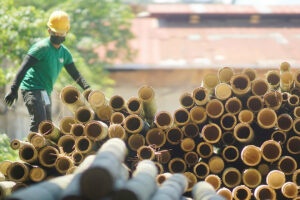BAMBOO producers could tap the market for bamboo pellets amid growing demand for sustainable fuel, exporters said.
In an article, the Philippine Exporters Confederation, Inc. (Philexport) said noted the demand for bamboo pellets as a substitute for wood used in producing biomass fuel.
“There is significant export potential for bamboo pellets as an eco-friendly replacement for wood pellets used as biomass fuel, a trend the Philippines as a major bamboo producer can tap into, research has showed,” the group said over the weekend.
Citing Brown University’s School of Public Health, Philexport said that demand for clean energy alternatives has been surging, with the wood pellet industry projected to double in size by 2026.
Pellet fuels are made from compressed organic material such as sawdust and related industrial byproducts.
However, the wood pellet industry is facing scrutiny over its impact, including black carbon and volatile organic compounds produced in the processing trees into dried pellets.
According to Philexport, this makes bamboo pellets a potential substitute due to the plant’s rapid growth and minimal environmental impact.
“Bamboo pellets have a wide range of uses. They can be used in cooking, heating, and operating power plants to address insufficient power supply. They even make excellent animal bedding and animal feed,” it said.
“They are safe and convenient for transport and storage. The pellets are lightweight, and they can be stored for a very long time,” it added.
Citing the Philippine Council for Agriculture, Aquatic, and Natural Resources Research and Development, Philexport said that the Philippines is the sixth largest exporter of bamboo.
“While it has extensive use as a raw material in many industries, Philippine bamboo exports reportedly slowed from a high of 106,000 kilograms (kg) in 2011 to 35,000 kg in 2015 and even further to 8,000 kg in 2018. Exports just picked up to 66,000 kg in 2020,” it added.
The country exports bamboo products to the US, Japan, the UK, Germany, and France.
As of 2022, investments in the industry totaled P89 million, while domestic sales stood at P143 million. — Justine Irish D. Tabile
